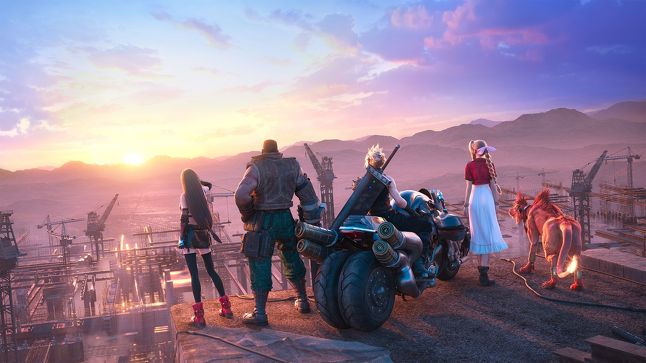Hardware supply shortages have created a very unusual first year for the two new consoles. I wouldn’t call it a détente, as such, but there’s a sense that rather than getting right into the expected console war, the uneasy calm before the storm has instead been significantly prolonged.
While consumers can’t get their hands on either system easily, there’s really no way of seeing the impact of various different decisions, announcements or pieces of news on the demand side of the business. Week to week console sales are driven exclusively by supply-side concerns, and anything that impacts actual demand for these systems is moving a needle so far above the current supply level as to make no difference worth a damn.
No difference worth a damn yet, anyway. The snapping up of console hardware by eager consumers as fast as the fabrication plants and assembly factories can churn them out may be disguising shifts in the demand side, but they’re still happening: this first year of Xbox Series X and PlayStation 5 are setting consumer perceptions and expectations for both platforms in fundamental and important ways, even if most of those consumers can’t actually go out and buy either platform as yet. Xbox’ solid showing at E3 couldn’t shift any more units because there weren’t any more units to shift, but it will in the long run; PlayStation’s building out of its own exclusive software pipeline similarly doesn’t make any difference to the installed base in the end, but it will in the long run.
The message sent by Greedfall and FF7R is PS Plus games are second-class citizens compared to purchased games — potentially huge problem in the making for Sony
The lack of direct feedback from the consumer market makes figuring out where consumer sentiment is moving into a bit of an exercise in reading the tea leaves — but it can be instructive to look at social media and other online chatter about various different announcements and pieces of news. This isn’t so much because what’s being said is representative of broad consumer sentiment — most regular consumers aren’t out there having strong opinions about the story of the week on Twitter, after all — but because it gives some hint of what kind of image core consumers are building up of each platform’s strengths and weaknesses, and how these “influencers” (ugh) are going to inform word-of-mouth around the platforms as supply issues settle down and competition really starts to heat up.
In that spirit, it’s been interesting to watch the response to a relatively low-profile piece of news this week — the launch of a PS5 update for Greedfall. In general terms, this isn’t remotely a big deal — Greedfall is fine, but it’s not an especially huge or popular game — but it comes with an important caveat that seems to have ignited an already smouldering seam of discontent among the chattering classes, namely that it won’t be available to people who got their copy of the game through a PlayStation Plus subscription.
Greedfall’s update isn’t the most high-profile example of that strategy, of course — that award undoubtedly goes to Final Fantasy 7 Remake, whose Intergrade update for PS5 also isn’t available to people who played the game through PS Plus. However, by adopting the same strategy Greedfall makes this look awfully like a trend — one that’s indicative of what’s easily, if uncharitably, characterised as Sony’s ongoing problem with handling software that spans this generational transition, and more generally with how it’s pitching PS Plus.
Sure, Greedfall itself isn’t a big deal, but the message being sent by this and FF7R — that PS Plus games, paid for through consumers’ monthly subscriptions, are lesser, second-class citizens compared to purchased games — is a potentially huge problem in the making for the company. The question of how Sony is going to respond to the value challenge posed by Microsoft’s Game Pass is increasingly central to this entire console generation; “by letting third parties devalue PS Plus editions of games in consumers’ eyes” is not a great opening move for their riposte.

Greedfall is not the most popular game, but its lack of PS5 upgrade for PS Plus subscribers has sparked a larger conversation about Sony’s service
Of course, the situation is more complex than that: the games which have pulled this “upgrades for everyone except PS Plus players” stunt are third-party titles and Sony doesn’t directly control those companies’ decision-making processes. I’m sure Sony would prefer for everyone to play nicely and let PS Plus editions have access to the same upgrades as everyone else — it just doesn’t prefer this option quite enough to include it in the contracts for PS Plus games, apparently, or in any other aspect of its control over the PlayStation platform. Whether through an act of omission, or through a simple underestimation of how important this would actually turn out to be, Sony doesn’t seem to have secured sensible terms from publishers of PS Plus games regarding their cross-gen upgrades.
If Sony doesn’t see PS Plus as a service that needs to compete with Game Pass, that doesn’t seem like a delusion that’ll survive for long once the console war’s direct competition comes crashing in.
I suspect the problem is the latter: Sony didn’t think this would be important. That’s a fairly understandable thing to overlook, actually — this is, after all, the first generational transition where cross-generation titles have been updated in this way, and compared to how things worked in the last transition (when publishers gleefully ran out to reissue their games at full price on the new systems), you’d be forgiven for raising an eyebrow at the apparent entitlement of consumers expecting all their old games to be upgraded to next-gen versions for free in the first place.
That attitude, however, doesn’t get you very far when your major competition is out there doing a better job in almost every regard on this front. For all that Sony made some solid technical efforts with getting the PS4 library working on PS5 (better than most people hoped, at least), almost everything related to cross-generational functionality or backwards compatibility on PS5 is a pale shadow of what Microsoft has accomplished — and the messiness of some versions of certain games being treated differently to other versions of the same games in terms of their access to PS5 updates is just the latest stumble on this front. (Not that the Xbox has been entirely flawless in this regard — looking at you, Control: Ultimate Edition — but the Smart Delivery system has generally been far, far better.)
It’s not that Sony’s strategy here isn’t understandable, and even perhaps well-founded. The company’s focus remains absolutely laser-locked on its first-party and exclusive software pipeline; as far as it’s concerned, that’s what made the PS4 great and that’s what’ll make the PS5 great. Anything to do with cross-gen stuff is just teething trouble that everyone will forget as soon as they’ve got shiny new PS5 exclusives to play. To quite an extent, they’re probably not wrong — but I suspect that Sony continues to underestimate how important Game Pass is going to be in this generation, and the extent to which the value offering is going to be an entirely new front in the console war that’s almost as important as software exclusivity, if not more so.

Final Fantasy 7 Remake Integrade’s PS5 upgrade is also unavailable to PS Plus subscribers, indicating a lack of control on Sony’s part over third-party cross-gen titles for its platform
That’s really never been the case before — console wars have always been fought with software and exclusivity as the weapons, and Sony undoubtedly still has the edge in that area, despite Microsoft working hard (and spending heavily) to catch up. Fighting a console war over value and business model is new — in previous generations, no matter how divergent the consoles were in other regards, their pricing and monetisation strategies always fell within the same broad ballpark — and I’m not sure that Sony yet fully appreciates that that’s what’s happening here.
Once the supply situation resolves, we’re going to start to find out just how appealing the Game Pass offering is to consumers. If it’s as big a deal as seems likely, Sony’s response is going to be vital — and right now that response is PS Plus, a service offering that can’t even corral its third-party partners into treating subscribers equally to regular consumers. In fact, I’m not even entirely convinced that Sony understands the extent to which PS Plus is being stacked up against Game Pass in consumers’ minds — the company has a tendency to still think of PS Plus’ monthly games and slowly building individual library as a kind of a free bonus over and above the access to online play that’s the major draw of the subscription, but for a great many consumers the primary (or even only) reason to subscribe to PS Plus is for the games, which makes it a direct competitor to the Game Pass offering.
That’s why the story that Greedfall and FF7R tell about PS Plus really matters — because it matters how that story will be picked up and related through consumer word-of-mouth. Game Pass is already an easy sell when you’re explaining it to console-upgrade-curious friends, compared to the slew of caveats and complexities you need to explain about PS Plus. Now here’s a fresh new wrinkle (“Yeah, some of the games you get on it, you’ll have to pay for separately if you want the PS5 update…”), at a time when Sony really needs to be upgrading and simplifying this experience, not allowing it to become more uneven and complex.
If the problem really is that Sony fundamentally doesn’t see PS Plus as a service that needs to compete with Game Pass, however, then that doesn’t seem like a delusion that’ll survive for long once the console war’s strange liminal period passes and the reality of direct competition comes crashing in.
GamesIndustry.biz
Source link
Related Post:
- Risk of Rain 2 Anniversary Update for Console
- Ubisoft at "high risk" of losing talent after abuse allegations
- Ubisoft Report States It's At A 'High' Risk Of Losing Talent Due To Toxic Work Culture
- Risk System footage - Nintendo Everything
- US consumer game spending up 10% to $4.6b for July | US Monthly Charts
- Ashley Maidy joins Riot as head of global consumer products | Jobs Roundup
- Risk Of Rain 2 Anniversary Update Makes Its Way To Switch Tomorrow
- Console IP remains a bad fit on mobile | Opinion
- E3 2024: Xbox has everything to prove | Opinion
- E3 is no longer a clear lens on the industry | Opinion
